ENT300: Small Business and Entrepreneurship Executive Summary Report
VerifiedAdded on 2020/12/29
|16
|4770
|220
Report
AI Summary
This report provides an executive summary of small business and entrepreneurship, examining various entrepreneurial ventures, their typologies, and the characteristics of successful entrepreneurs. It explores the differences and similarities between ventures, analyzes the impact of micro and small businesses on the economy, and highlights the importance of small businesses and start-ups to social and economic growth. The report also identifies the traits and skills that differentiate successful entrepreneurs from other business managers and discusses how background and experience can influence entrepreneurship. The report includes examples, statistical data, and a conclusion summarizing the key findings regarding entrepreneurship.

SMALL BUSINESS AND
ENTREPRENEURSHIP
ENTREPRENEURSHIP
Paraphrase This Document
Need a fresh take? Get an instant paraphrase of this document with our AI Paraphraser

Executive Summary
Report has highlighted the scope, size and growth of various types of entrepreneurship ventures.
It has also focused on how the entrepreneurial personality traits. Communication and honesty has
helped the entrepreneurs in achieving success. There are various traits which differentiate
entrepreneurs from various other business managers.
Report has highlighted the scope, size and growth of various types of entrepreneurship ventures.
It has also focused on how the entrepreneurial personality traits. Communication and honesty has
helped the entrepreneurs in achieving success. There are various traits which differentiate
entrepreneurs from various other business managers.
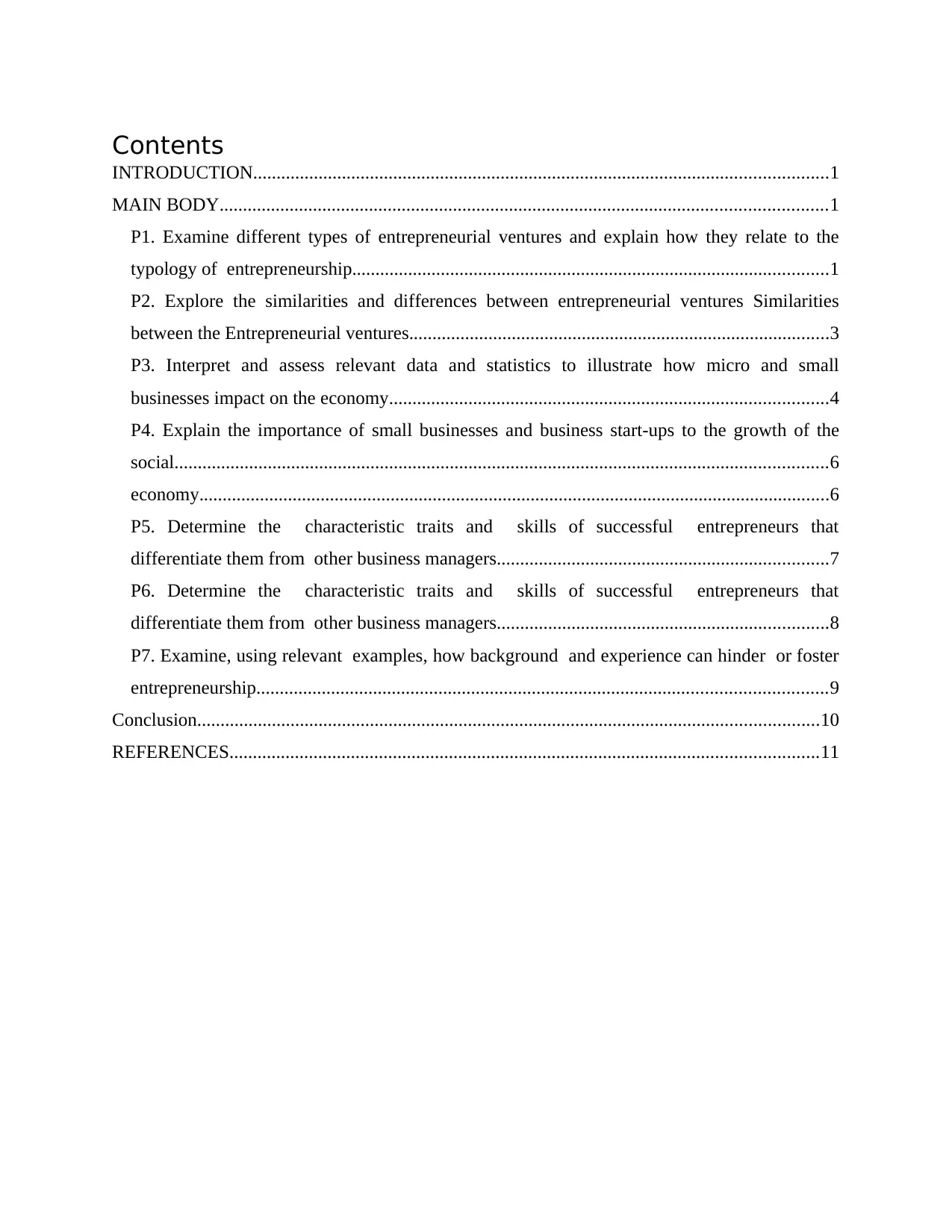
Contents
INTRODUCTION...........................................................................................................................1
MAIN BODY..................................................................................................................................1
P1. Examine different types of entrepreneurial ventures and explain how they relate to the
typology of entrepreneurship......................................................................................................1
P2. Explore the similarities and differences between entrepreneurial ventures Similarities
between the Entrepreneurial ventures..........................................................................................3
P3. Interpret and assess relevant data and statistics to illustrate how micro and small
businesses impact on the economy..............................................................................................4
P4. Explain the importance of small businesses and business start-ups to the growth of the
social............................................................................................................................................6
economy.......................................................................................................................................6
P5. Determine the characteristic traits and skills of successful entrepreneurs that
differentiate them from other business managers.......................................................................7
P6. Determine the characteristic traits and skills of successful entrepreneurs that
differentiate them from other business managers.......................................................................8
P7. Examine, using relevant examples, how background and experience can hinder or foster
entrepreneurship..........................................................................................................................9
Conclusion.....................................................................................................................................10
REFERENCES..............................................................................................................................11
INTRODUCTION...........................................................................................................................1
MAIN BODY..................................................................................................................................1
P1. Examine different types of entrepreneurial ventures and explain how they relate to the
typology of entrepreneurship......................................................................................................1
P2. Explore the similarities and differences between entrepreneurial ventures Similarities
between the Entrepreneurial ventures..........................................................................................3
P3. Interpret and assess relevant data and statistics to illustrate how micro and small
businesses impact on the economy..............................................................................................4
P4. Explain the importance of small businesses and business start-ups to the growth of the
social............................................................................................................................................6
economy.......................................................................................................................................6
P5. Determine the characteristic traits and skills of successful entrepreneurs that
differentiate them from other business managers.......................................................................7
P6. Determine the characteristic traits and skills of successful entrepreneurs that
differentiate them from other business managers.......................................................................8
P7. Examine, using relevant examples, how background and experience can hinder or foster
entrepreneurship..........................................................................................................................9
Conclusion.....................................................................................................................................10
REFERENCES..............................................................................................................................11
⊘ This is a preview!⊘
Do you want full access?
Subscribe today to unlock all pages.

Trusted by 1+ million students worldwide
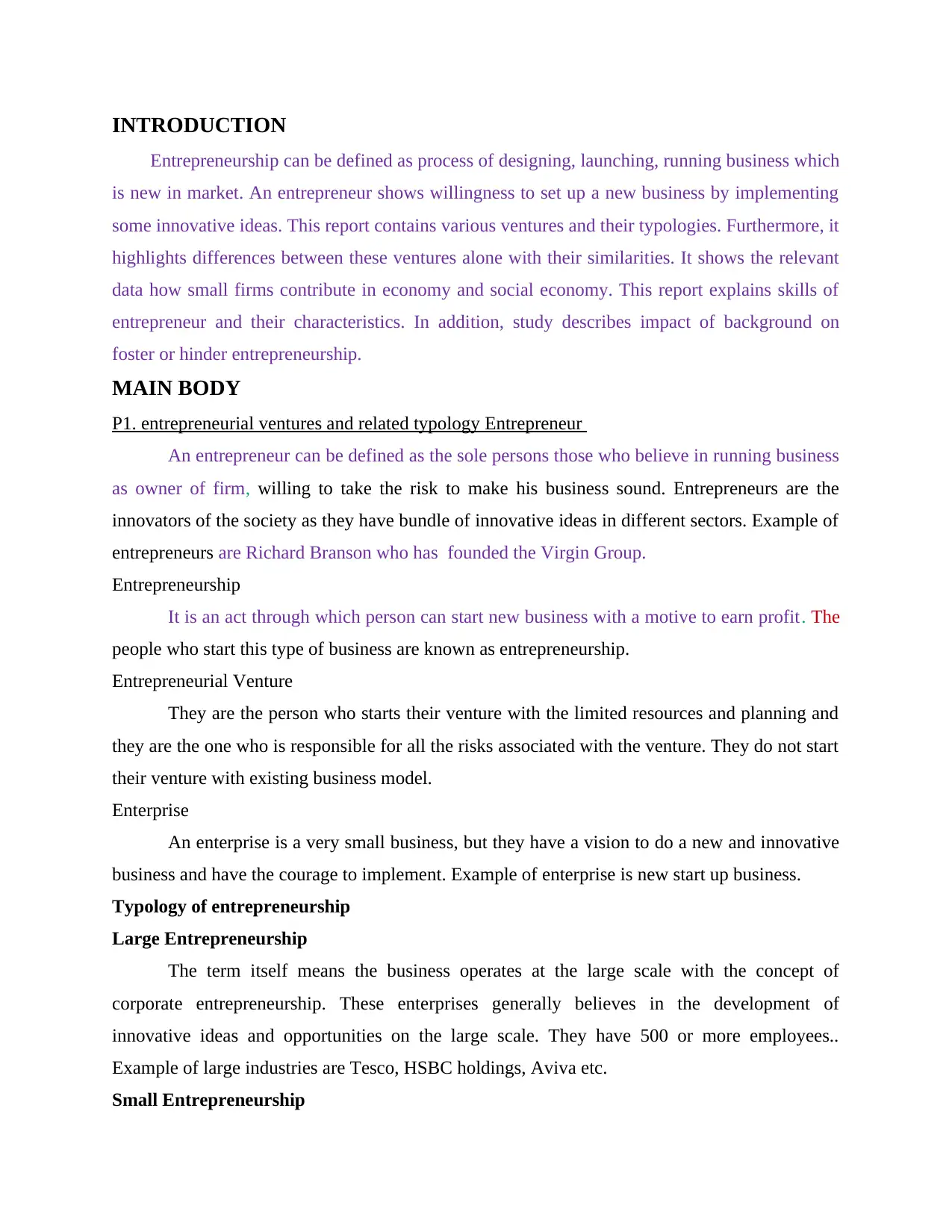
INTRODUCTION
Entrepreneurship can be defined as process of designing, launching, running business which
is new in market. An entrepreneur shows willingness to set up a new business by implementing
some innovative ideas. This report contains various ventures and their typologies. Furthermore, it
highlights differences between these ventures alone with their similarities. It shows the relevant
data how small firms contribute in economy and social economy. This report explains skills of
entrepreneur and their characteristics. In addition, study describes impact of background on
foster or hinder entrepreneurship.
MAIN BODY
P1. entrepreneurial ventures and related typology Entrepreneur
An entrepreneur can be defined as the sole persons those who believe in running business
as owner of firm, willing to take the risk to make his business sound. Entrepreneurs are the
innovators of the society as they have bundle of innovative ideas in different sectors. Example of
entrepreneurs are Richard Branson who has founded the Virgin Group.
Entrepreneurship
It is an act through which person can start new business with a motive to earn profit. The
people who start this type of business are known as entrepreneurship.
Entrepreneurial Venture
They are the person who starts their venture with the limited resources and planning and
they are the one who is responsible for all the risks associated with the venture. They do not start
their venture with existing business model.
Enterprise
An enterprise is a very small business, but they have a vision to do a new and innovative
business and have the courage to implement. Example of enterprise is new start up business.
Typology of entrepreneurship
Large Entrepreneurship
The term itself means the business operates at the large scale with the concept of
corporate entrepreneurship. These enterprises generally believes in the development of
innovative ideas and opportunities on the large scale. They have 500 or more employees..
Example of large industries are Tesco, HSBC holdings, Aviva etc.
Small Entrepreneurship
Entrepreneurship can be defined as process of designing, launching, running business which
is new in market. An entrepreneur shows willingness to set up a new business by implementing
some innovative ideas. This report contains various ventures and their typologies. Furthermore, it
highlights differences between these ventures alone with their similarities. It shows the relevant
data how small firms contribute in economy and social economy. This report explains skills of
entrepreneur and their characteristics. In addition, study describes impact of background on
foster or hinder entrepreneurship.
MAIN BODY
P1. entrepreneurial ventures and related typology Entrepreneur
An entrepreneur can be defined as the sole persons those who believe in running business
as owner of firm, willing to take the risk to make his business sound. Entrepreneurs are the
innovators of the society as they have bundle of innovative ideas in different sectors. Example of
entrepreneurs are Richard Branson who has founded the Virgin Group.
Entrepreneurship
It is an act through which person can start new business with a motive to earn profit. The
people who start this type of business are known as entrepreneurship.
Entrepreneurial Venture
They are the person who starts their venture with the limited resources and planning and
they are the one who is responsible for all the risks associated with the venture. They do not start
their venture with existing business model.
Enterprise
An enterprise is a very small business, but they have a vision to do a new and innovative
business and have the courage to implement. Example of enterprise is new start up business.
Typology of entrepreneurship
Large Entrepreneurship
The term itself means the business operates at the large scale with the concept of
corporate entrepreneurship. These enterprises generally believes in the development of
innovative ideas and opportunities on the large scale. They have 500 or more employees..
Example of large industries are Tesco, HSBC holdings, Aviva etc.
Small Entrepreneurship
Paraphrase This Document
Need a fresh take? Get an instant paraphrase of this document with our AI Paraphraser
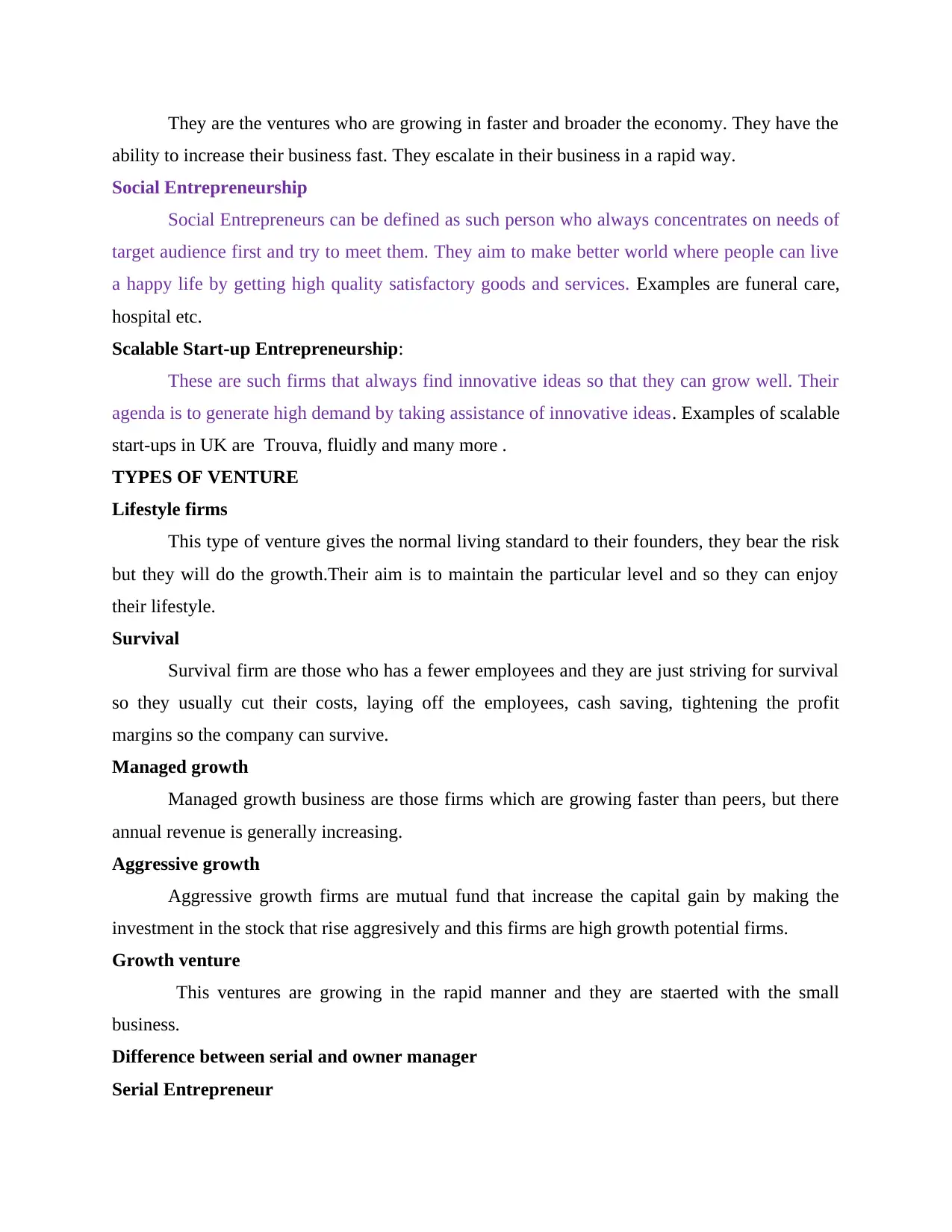
They are the ventures who are growing in faster and broader the economy. They have the
ability to increase their business fast. They escalate in their business in a rapid way.
Social Entrepreneurship
Social Entrepreneurs can be defined as such person who always concentrates on needs of
target audience first and try to meet them. They aim to make better world where people can live
a happy life by getting high quality satisfactory goods and services. Examples are funeral care,
hospital etc.
Scalable Start-up Entrepreneurship:
These are such firms that always find innovative ideas so that they can grow well. Their
agenda is to generate high demand by taking assistance of innovative ideas. Examples of scalable
start-ups in UK are Trouva, fluidly and many more .
TYPES OF VENTURE
Lifestyle firms
This type of venture gives the normal living standard to their founders, they bear the risk
but they will do the growth.Their aim is to maintain the particular level and so they can enjoy
their lifestyle.
Survival
Survival firm are those who has a fewer employees and they are just striving for survival
so they usually cut their costs, laying off the employees, cash saving, tightening the profit
margins so the company can survive.
Managed growth
Managed growth business are those firms which are growing faster than peers, but there
annual revenue is generally increasing.
Aggressive growth
Aggressive growth firms are mutual fund that increase the capital gain by making the
investment in the stock that rise aggresively and this firms are high growth potential firms.
Growth venture
This ventures are growing in the rapid manner and they are staerted with the small
business.
Difference between serial and owner manager
Serial Entrepreneur
ability to increase their business fast. They escalate in their business in a rapid way.
Social Entrepreneurship
Social Entrepreneurs can be defined as such person who always concentrates on needs of
target audience first and try to meet them. They aim to make better world where people can live
a happy life by getting high quality satisfactory goods and services. Examples are funeral care,
hospital etc.
Scalable Start-up Entrepreneurship:
These are such firms that always find innovative ideas so that they can grow well. Their
agenda is to generate high demand by taking assistance of innovative ideas. Examples of scalable
start-ups in UK are Trouva, fluidly and many more .
TYPES OF VENTURE
Lifestyle firms
This type of venture gives the normal living standard to their founders, they bear the risk
but they will do the growth.Their aim is to maintain the particular level and so they can enjoy
their lifestyle.
Survival
Survival firm are those who has a fewer employees and they are just striving for survival
so they usually cut their costs, laying off the employees, cash saving, tightening the profit
margins so the company can survive.
Managed growth
Managed growth business are those firms which are growing faster than peers, but there
annual revenue is generally increasing.
Aggressive growth
Aggressive growth firms are mutual fund that increase the capital gain by making the
investment in the stock that rise aggresively and this firms are high growth potential firms.
Growth venture
This ventures are growing in the rapid manner and they are staerted with the small
business.
Difference between serial and owner manager
Serial Entrepreneur
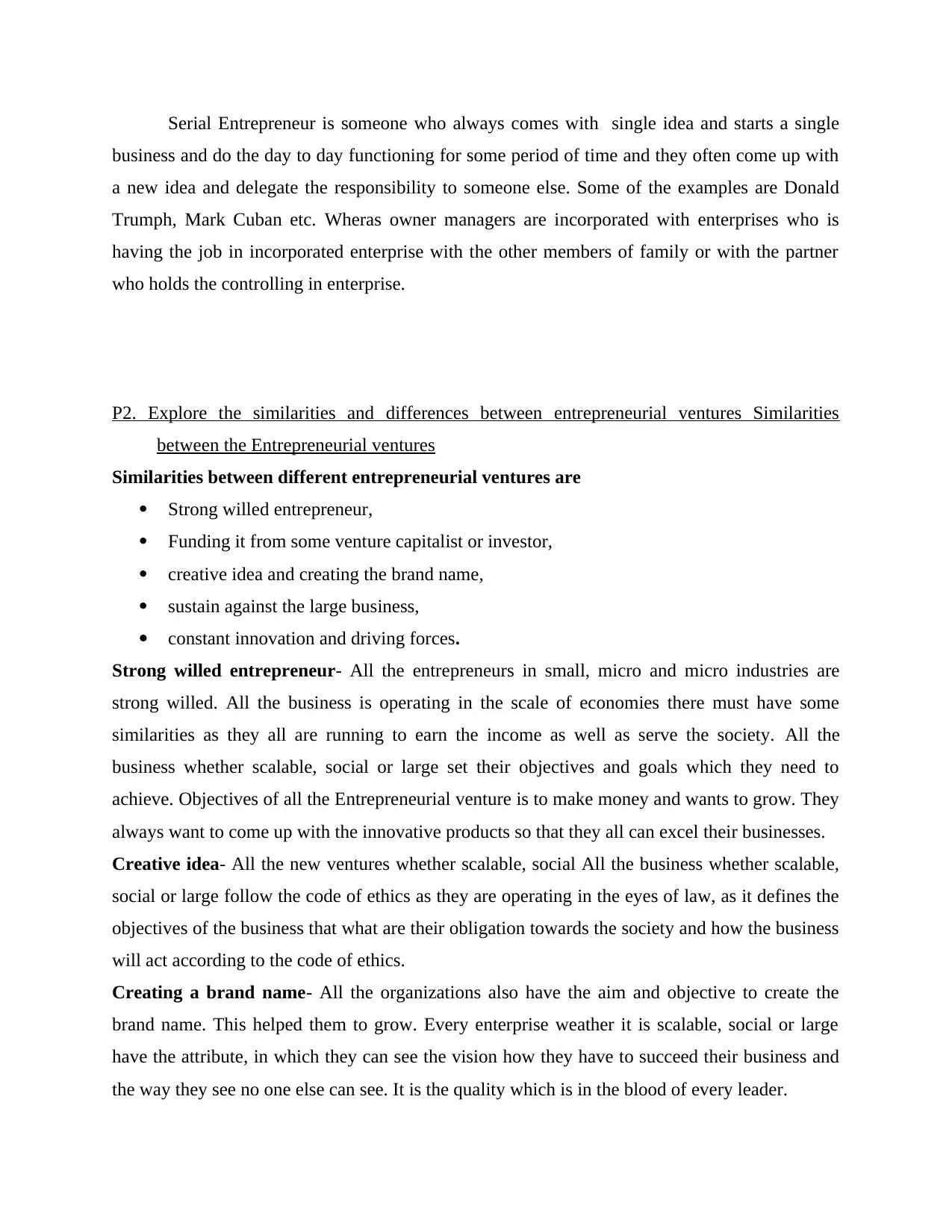
Serial Entrepreneur is someone who always comes with single idea and starts a single
business and do the day to day functioning for some period of time and they often come up with
a new idea and delegate the responsibility to someone else. Some of the examples are Donald
Trumph, Mark Cuban etc. Wheras owner managers are incorporated with enterprises who is
having the job in incorporated enterprise with the other members of family or with the partner
who holds the controlling in enterprise.
P2. Explore the similarities and differences between entrepreneurial ventures Similarities
between the Entrepreneurial ventures
Similarities between different entrepreneurial ventures are
Strong willed entrepreneur,
Funding it from some venture capitalist or investor,
creative idea and creating the brand name,
sustain against the large business,
constant innovation and driving forces.
Strong willed entrepreneur- All the entrepreneurs in small, micro and micro industries are
strong willed. All the business is operating in the scale of economies there must have some
similarities as they all are running to earn the income as well as serve the society. All the
business whether scalable, social or large set their objectives and goals which they need to
achieve. Objectives of all the Entrepreneurial venture is to make money and wants to grow. They
always want to come up with the innovative products so that they all can excel their businesses.
Creative idea- All the new ventures whether scalable, social All the business whether scalable,
social or large follow the code of ethics as they are operating in the eyes of law, as it defines the
objectives of the business that what are their obligation towards the society and how the business
will act according to the code of ethics.
Creating a brand name- All the organizations also have the aim and objective to create the
brand name. This helped them to grow. Every enterprise weather it is scalable, social or large
have the attribute, in which they can see the vision how they have to succeed their business and
the way they see no one else can see. It is the quality which is in the blood of every leader.
business and do the day to day functioning for some period of time and they often come up with
a new idea and delegate the responsibility to someone else. Some of the examples are Donald
Trumph, Mark Cuban etc. Wheras owner managers are incorporated with enterprises who is
having the job in incorporated enterprise with the other members of family or with the partner
who holds the controlling in enterprise.
P2. Explore the similarities and differences between entrepreneurial ventures Similarities
between the Entrepreneurial ventures
Similarities between different entrepreneurial ventures are
Strong willed entrepreneur,
Funding it from some venture capitalist or investor,
creative idea and creating the brand name,
sustain against the large business,
constant innovation and driving forces.
Strong willed entrepreneur- All the entrepreneurs in small, micro and micro industries are
strong willed. All the business is operating in the scale of economies there must have some
similarities as they all are running to earn the income as well as serve the society. All the
business whether scalable, social or large set their objectives and goals which they need to
achieve. Objectives of all the Entrepreneurial venture is to make money and wants to grow. They
always want to come up with the innovative products so that they all can excel their businesses.
Creative idea- All the new ventures whether scalable, social All the business whether scalable,
social or large follow the code of ethics as they are operating in the eyes of law, as it defines the
objectives of the business that what are their obligation towards the society and how the business
will act according to the code of ethics.
Creating a brand name- All the organizations also have the aim and objective to create the
brand name. This helped them to grow. Every enterprise weather it is scalable, social or large
have the attribute, in which they can see the vision how they have to succeed their business and
the way they see no one else can see. It is the quality which is in the blood of every leader.
⊘ This is a preview!⊘
Do you want full access?
Subscribe today to unlock all pages.

Trusted by 1+ million students worldwide
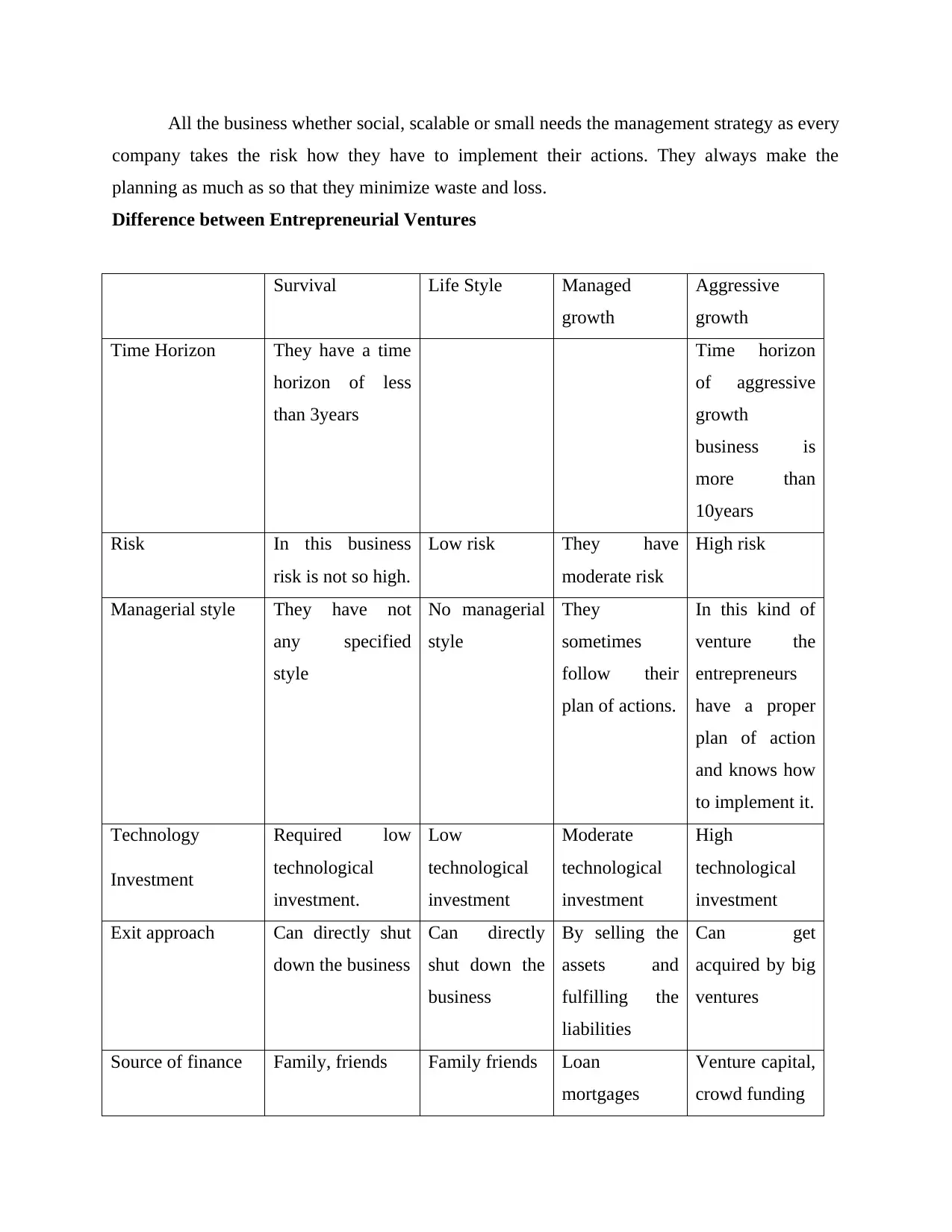
All the business whether social, scalable or small needs the management strategy as every
company takes the risk how they have to implement their actions. They always make the
planning as much as so that they minimize waste and loss.
Difference between Entrepreneurial Ventures
Survival Life Style Managed
growth
Aggressive
growth
Time Horizon They have a time
horizon of less
than 3years
Time horizon
of aggressive
growth
business is
more than
10years
Risk In this business
risk is not so high.
Low risk They have
moderate risk
High risk
Managerial style They have not
any specified
style
No managerial
style
They
sometimes
follow their
plan of actions.
In this kind of
venture the
entrepreneurs
have a proper
plan of action
and knows how
to implement it.
Technology
Investment
Required low
technological
investment.
Low
technological
investment
Moderate
technological
investment
High
technological
investment
Exit approach Can directly shut
down the business
Can directly
shut down the
business
By selling the
assets and
fulfilling the
liabilities
Can get
acquired by big
ventures
Source of finance Family, friends Family friends Loan
mortgages
Venture capital,
crowd funding
company takes the risk how they have to implement their actions. They always make the
planning as much as so that they minimize waste and loss.
Difference between Entrepreneurial Ventures
Survival Life Style Managed
growth
Aggressive
growth
Time Horizon They have a time
horizon of less
than 3years
Time horizon
of aggressive
growth
business is
more than
10years
Risk In this business
risk is not so high.
Low risk They have
moderate risk
High risk
Managerial style They have not
any specified
style
No managerial
style
They
sometimes
follow their
plan of actions.
In this kind of
venture the
entrepreneurs
have a proper
plan of action
and knows how
to implement it.
Technology
Investment
Required low
technological
investment.
Low
technological
investment
Moderate
technological
investment
High
technological
investment
Exit approach Can directly shut
down the business
Can directly
shut down the
business
By selling the
assets and
fulfilling the
liabilities
Can get
acquired by big
ventures
Source of finance Family, friends Family friends Loan
mortgages
Venture capital,
crowd funding
Paraphrase This Document
Need a fresh take? Get an instant paraphrase of this document with our AI Paraphraser
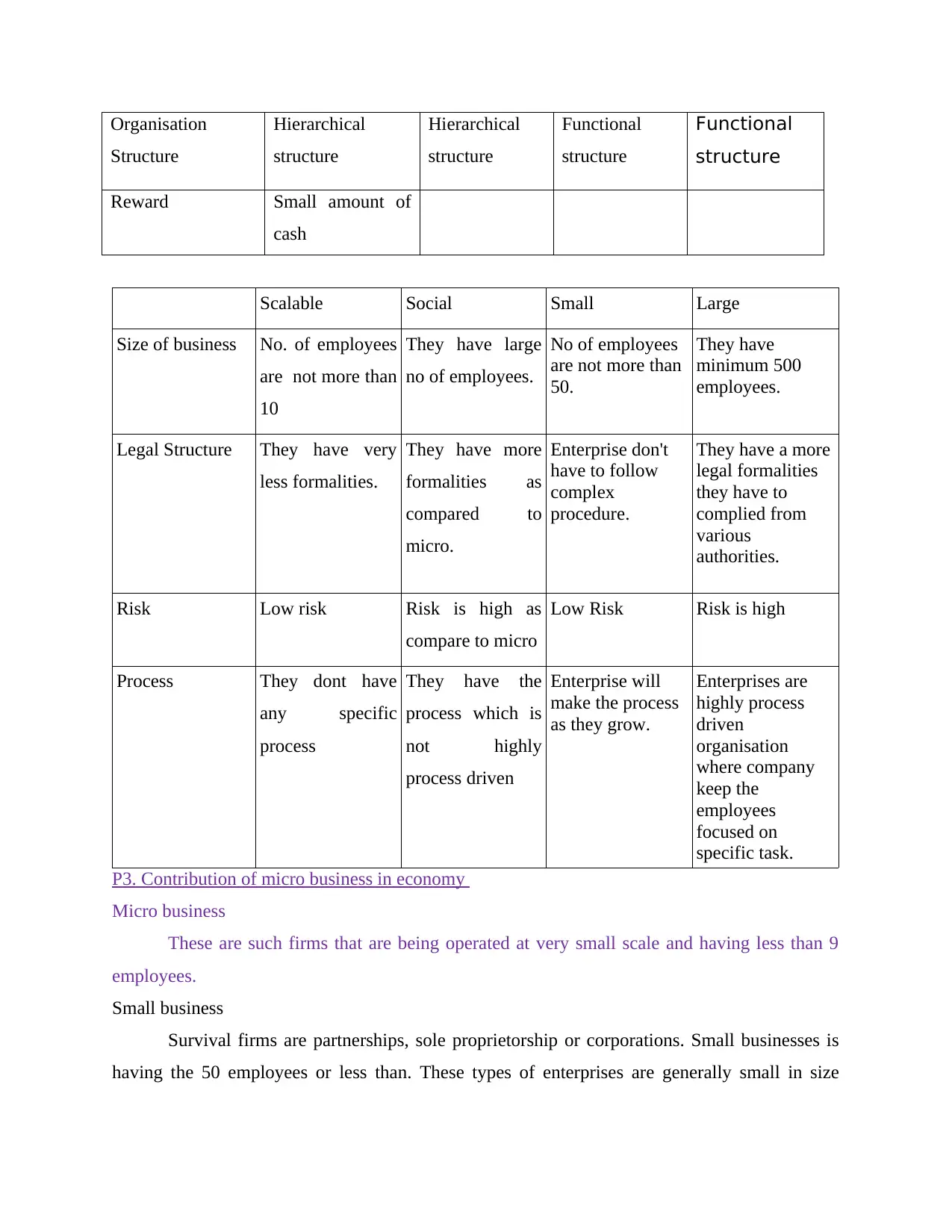
Organisation
Structure
Hierarchical
structure
Hierarchical
structure
Functional
structure
Functional
structure
Reward Small amount of
cash
Scalable Social Small Large
Size of business No. of employees
are not more than
10
They have large
no of employees.
No of employees
are not more than
50.
They have
minimum 500
employees.
Legal Structure They have very
less formalities.
They have more
formalities as
compared to
micro.
Enterprise don't
have to follow
complex
procedure.
They have a more
legal formalities
they have to
complied from
various
authorities.
Risk Low risk Risk is high as
compare to micro
Low Risk Risk is high
Process They dont have
any specific
process
They have the
process which is
not highly
process driven
Enterprise will
make the process
as they grow.
Enterprises are
highly process
driven
organisation
where company
keep the
employees
focused on
specific task.
P3. Contribution of micro business in economy
Micro business
These are such firms that are being operated at very small scale and having less than 9
employees.
Small business
Survival firms are partnerships, sole proprietorship or corporations. Small businesses is
having the 50 employees or less than. These types of enterprises are generally small in size
Structure
Hierarchical
structure
Hierarchical
structure
Functional
structure
Functional
structure
Reward Small amount of
cash
Scalable Social Small Large
Size of business No. of employees
are not more than
10
They have large
no of employees.
No of employees
are not more than
50.
They have
minimum 500
employees.
Legal Structure They have very
less formalities.
They have more
formalities as
compared to
micro.
Enterprise don't
have to follow
complex
procedure.
They have a more
legal formalities
they have to
complied from
various
authorities.
Risk Low risk Risk is high as
compare to micro
Low Risk Risk is high
Process They dont have
any specific
process
They have the
process which is
not highly
process driven
Enterprise will
make the process
as they grow.
Enterprises are
highly process
driven
organisation
where company
keep the
employees
focused on
specific task.
P3. Contribution of micro business in economy
Micro business
These are such firms that are being operated at very small scale and having less than 9
employees.
Small business
Survival firms are partnerships, sole proprietorship or corporations. Small businesses is
having the 50 employees or less than. These types of enterprises are generally small in size
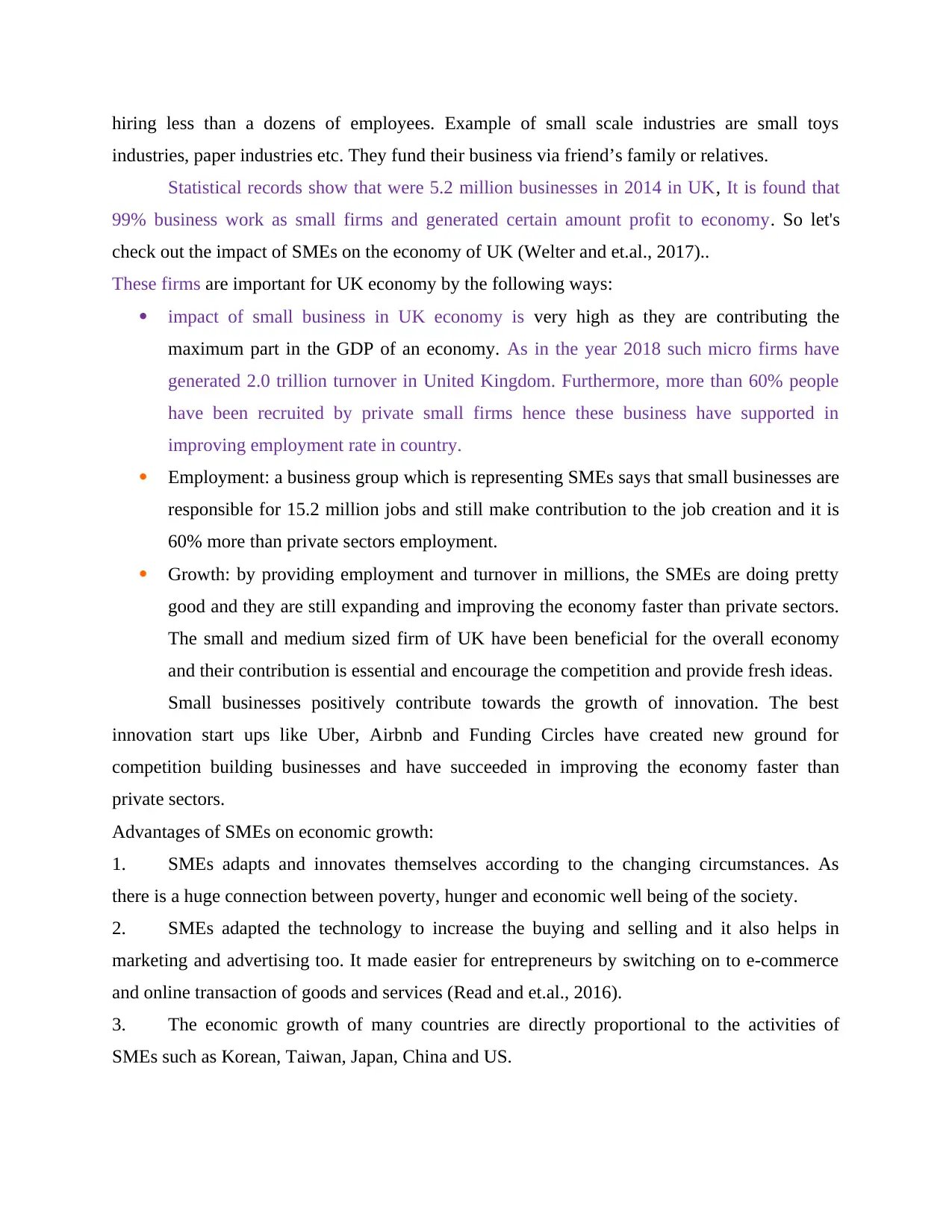
hiring less than a dozens of employees. Example of small scale industries are small toys
industries, paper industries etc. They fund their business via friend’s family or relatives.
Statistical records show that were 5.2 million businesses in 2014 in UK, It is found that
99% business work as small firms and generated certain amount profit to economy. So let's
check out the impact of SMEs on the economy of UK (Welter and et.al., 2017)..
These firms are important for UK economy by the following ways:
impact of small business in UK economy is very high as they are contributing the
maximum part in the GDP of an economy. As in the year 2018 such micro firms have
generated 2.0 trillion turnover in United Kingdom. Furthermore, more than 60% people
have been recruited by private small firms hence these business have supported in
improving employment rate in country.
Employment: a business group which is representing SMEs says that small businesses are
responsible for 15.2 million jobs and still make contribution to the job creation and it is
60% more than private sectors employment.
Growth: by providing employment and turnover in millions, the SMEs are doing pretty
good and they are still expanding and improving the economy faster than private sectors.
The small and medium sized firm of UK have been beneficial for the overall economy
and their contribution is essential and encourage the competition and provide fresh ideas.
Small businesses positively contribute towards the growth of innovation. The best
innovation start ups like Uber, Airbnb and Funding Circles have created new ground for
competition building businesses and have succeeded in improving the economy faster than
private sectors.
Advantages of SMEs on economic growth:
1. SMEs adapts and innovates themselves according to the changing circumstances. As
there is a huge connection between poverty, hunger and economic well being of the society.
2. SMEs adapted the technology to increase the buying and selling and it also helps in
marketing and advertising too. It made easier for entrepreneurs by switching on to e-commerce
and online transaction of goods and services (Read and et.al., 2016).
3. The economic growth of many countries are directly proportional to the activities of
SMEs such as Korean, Taiwan, Japan, China and US.
industries, paper industries etc. They fund their business via friend’s family or relatives.
Statistical records show that were 5.2 million businesses in 2014 in UK, It is found that
99% business work as small firms and generated certain amount profit to economy. So let's
check out the impact of SMEs on the economy of UK (Welter and et.al., 2017)..
These firms are important for UK economy by the following ways:
impact of small business in UK economy is very high as they are contributing the
maximum part in the GDP of an economy. As in the year 2018 such micro firms have
generated 2.0 trillion turnover in United Kingdom. Furthermore, more than 60% people
have been recruited by private small firms hence these business have supported in
improving employment rate in country.
Employment: a business group which is representing SMEs says that small businesses are
responsible for 15.2 million jobs and still make contribution to the job creation and it is
60% more than private sectors employment.
Growth: by providing employment and turnover in millions, the SMEs are doing pretty
good and they are still expanding and improving the economy faster than private sectors.
The small and medium sized firm of UK have been beneficial for the overall economy
and their contribution is essential and encourage the competition and provide fresh ideas.
Small businesses positively contribute towards the growth of innovation. The best
innovation start ups like Uber, Airbnb and Funding Circles have created new ground for
competition building businesses and have succeeded in improving the economy faster than
private sectors.
Advantages of SMEs on economic growth:
1. SMEs adapts and innovates themselves according to the changing circumstances. As
there is a huge connection between poverty, hunger and economic well being of the society.
2. SMEs adapted the technology to increase the buying and selling and it also helps in
marketing and advertising too. It made easier for entrepreneurs by switching on to e-commerce
and online transaction of goods and services (Read and et.al., 2016).
3. The economic growth of many countries are directly proportional to the activities of
SMEs such as Korean, Taiwan, Japan, China and US.
⊘ This is a preview!⊘
Do you want full access?
Subscribe today to unlock all pages.

Trusted by 1+ million students worldwide
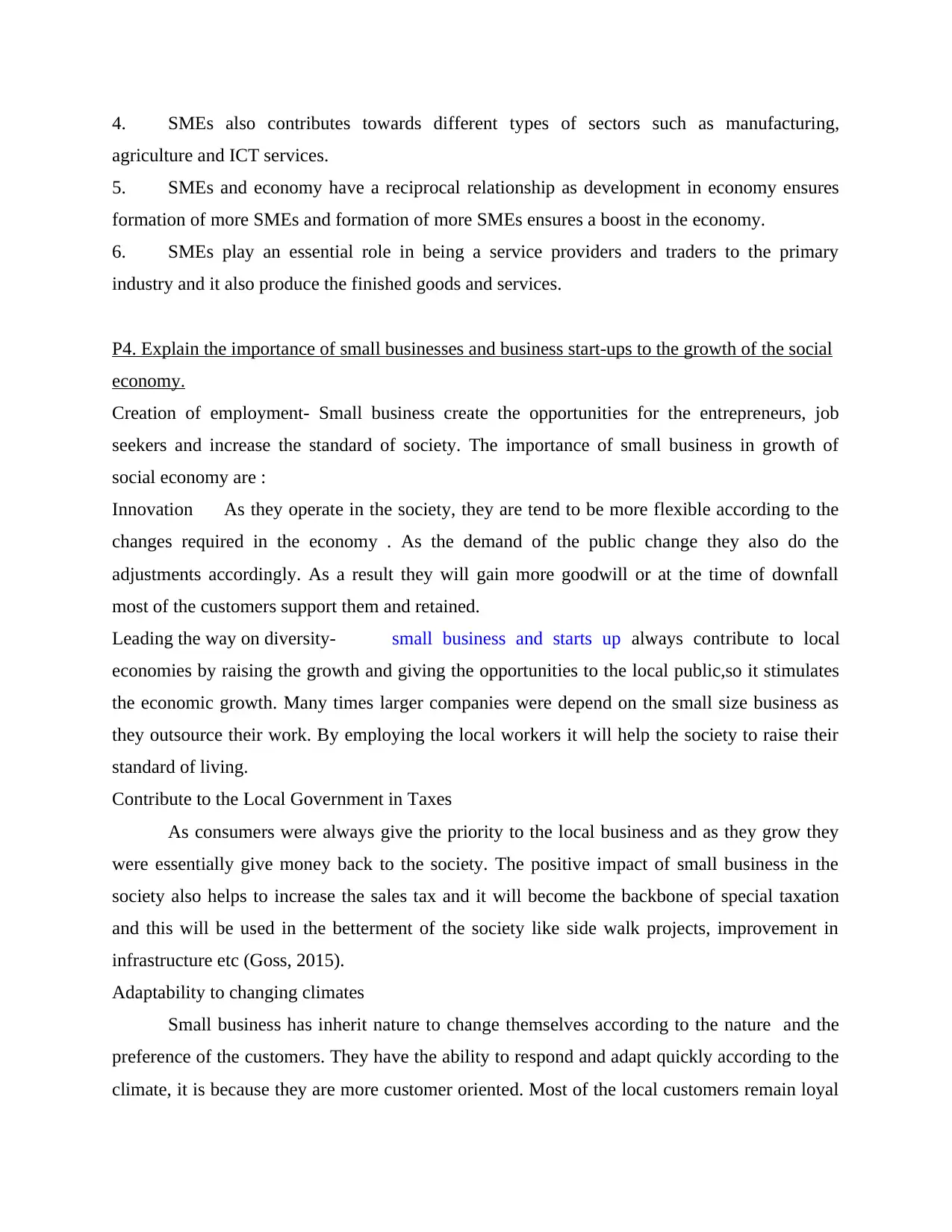
4. SMEs also contributes towards different types of sectors such as manufacturing,
agriculture and ICT services.
5. SMEs and economy have a reciprocal relationship as development in economy ensures
formation of more SMEs and formation of more SMEs ensures a boost in the economy.
6. SMEs play an essential role in being a service providers and traders to the primary
industry and it also produce the finished goods and services.
P4. Explain the importance of small businesses and business start-ups to the growth of the social
economy.
Creation of employment- Small business create the opportunities for the entrepreneurs, job
seekers and increase the standard of society. The importance of small business in growth of
social economy are :
Innovation As they operate in the society, they are tend to be more flexible according to the
changes required in the economy . As the demand of the public change they also do the
adjustments accordingly. As a result they will gain more goodwill or at the time of downfall
most of the customers support them and retained.
Leading the way on diversity- small business and starts up always contribute to local
economies by raising the growth and giving the opportunities to the local public,so it stimulates
the economic growth. Many times larger companies were depend on the small size business as
they outsource their work. By employing the local workers it will help the society to raise their
standard of living.
Contribute to the Local Government in Taxes
As consumers were always give the priority to the local business and as they grow they
were essentially give money back to the society. The positive impact of small business in the
society also helps to increase the sales tax and it will become the backbone of special taxation
and this will be used in the betterment of the society like side walk projects, improvement in
infrastructure etc (Goss, 2015).
Adaptability to changing climates
Small business has inherit nature to change themselves according to the nature and the
preference of the customers. They have the ability to respond and adapt quickly according to the
climate, it is because they are more customer oriented. Most of the local customers remain loyal
agriculture and ICT services.
5. SMEs and economy have a reciprocal relationship as development in economy ensures
formation of more SMEs and formation of more SMEs ensures a boost in the economy.
6. SMEs play an essential role in being a service providers and traders to the primary
industry and it also produce the finished goods and services.
P4. Explain the importance of small businesses and business start-ups to the growth of the social
economy.
Creation of employment- Small business create the opportunities for the entrepreneurs, job
seekers and increase the standard of society. The importance of small business in growth of
social economy are :
Innovation As they operate in the society, they are tend to be more flexible according to the
changes required in the economy . As the demand of the public change they also do the
adjustments accordingly. As a result they will gain more goodwill or at the time of downfall
most of the customers support them and retained.
Leading the way on diversity- small business and starts up always contribute to local
economies by raising the growth and giving the opportunities to the local public,so it stimulates
the economic growth. Many times larger companies were depend on the small size business as
they outsource their work. By employing the local workers it will help the society to raise their
standard of living.
Contribute to the Local Government in Taxes
As consumers were always give the priority to the local business and as they grow they
were essentially give money back to the society. The positive impact of small business in the
society also helps to increase the sales tax and it will become the backbone of special taxation
and this will be used in the betterment of the society like side walk projects, improvement in
infrastructure etc (Goss, 2015).
Adaptability to changing climates
Small business has inherit nature to change themselves according to the nature and the
preference of the customers. They have the ability to respond and adapt quickly according to the
climate, it is because they are more customer oriented. Most of the local customers remain loyal
Paraphrase This Document
Need a fresh take? Get an instant paraphrase of this document with our AI Paraphraser
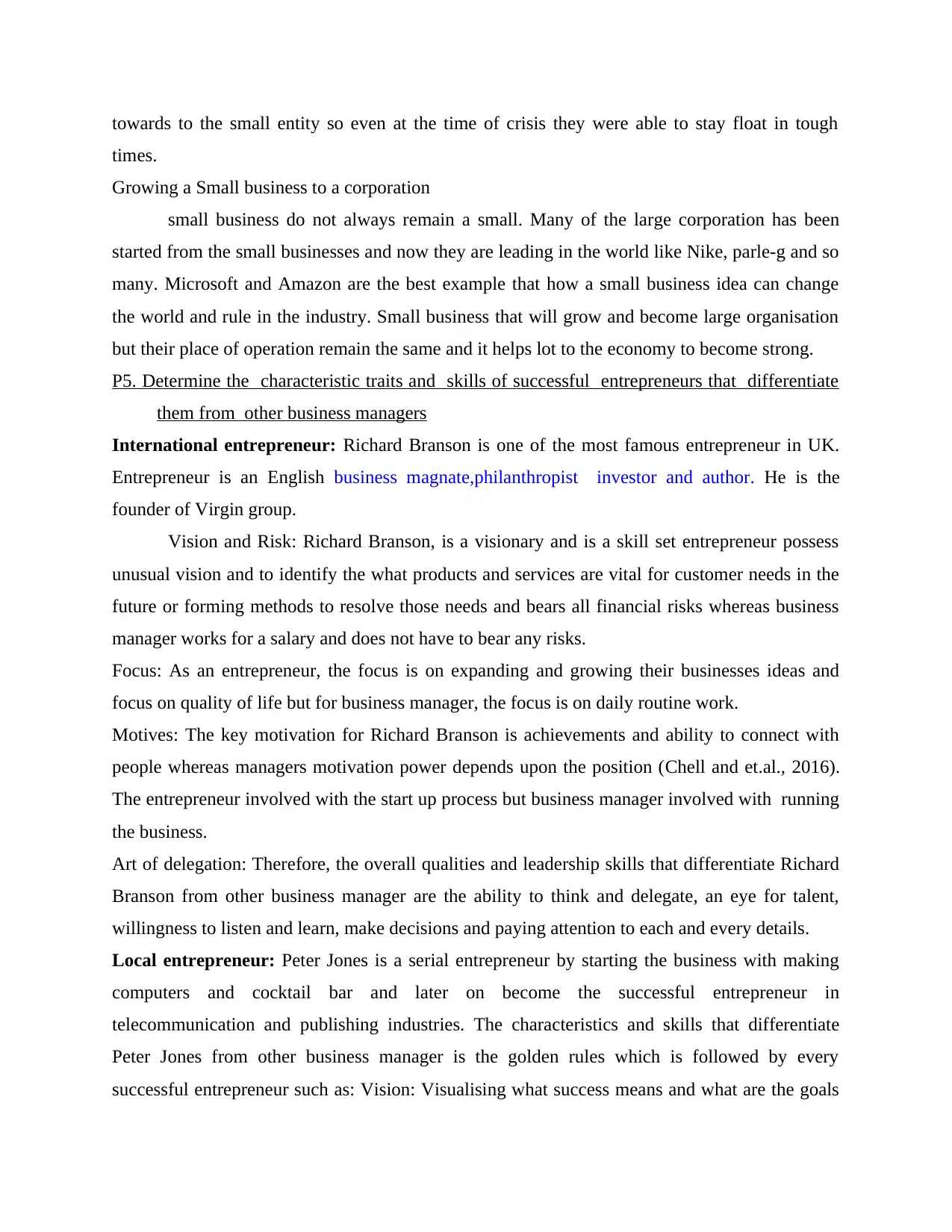
towards to the small entity so even at the time of crisis they were able to stay float in tough
times.
Growing a Small business to a corporation
small business do not always remain a small. Many of the large corporation has been
started from the small businesses and now they are leading in the world like Nike, parle-g and so
many. Microsoft and Amazon are the best example that how a small business idea can change
the world and rule in the industry. Small business that will grow and become large organisation
but their place of operation remain the same and it helps lot to the economy to become strong.
P5. Determine the characteristic traits and skills of successful entrepreneurs that differentiate
them from other business managers
International entrepreneur: Richard Branson is one of the most famous entrepreneur in UK.
Entrepreneur is an English business magnate,philanthropist investor and author. He is the
founder of Virgin group.
Vision and Risk: Richard Branson, is a visionary and is a skill set entrepreneur possess
unusual vision and to identify the what products and services are vital for customer needs in the
future or forming methods to resolve those needs and bears all financial risks whereas business
manager works for a salary and does not have to bear any risks.
Focus: As an entrepreneur, the focus is on expanding and growing their businesses ideas and
focus on quality of life but for business manager, the focus is on daily routine work.
Motives: The key motivation for Richard Branson is achievements and ability to connect with
people whereas managers motivation power depends upon the position (Chell and et.al., 2016).
The entrepreneur involved with the start up process but business manager involved with running
the business.
Art of delegation: Therefore, the overall qualities and leadership skills that differentiate Richard
Branson from other business manager are the ability to think and delegate, an eye for talent,
willingness to listen and learn, make decisions and paying attention to each and every details.
Local entrepreneur: Peter Jones is a serial entrepreneur by starting the business with making
computers and cocktail bar and later on become the successful entrepreneur in
telecommunication and publishing industries. The characteristics and skills that differentiate
Peter Jones from other business manager is the golden rules which is followed by every
successful entrepreneur such as: Vision: Visualising what success means and what are the goals
times.
Growing a Small business to a corporation
small business do not always remain a small. Many of the large corporation has been
started from the small businesses and now they are leading in the world like Nike, parle-g and so
many. Microsoft and Amazon are the best example that how a small business idea can change
the world and rule in the industry. Small business that will grow and become large organisation
but their place of operation remain the same and it helps lot to the economy to become strong.
P5. Determine the characteristic traits and skills of successful entrepreneurs that differentiate
them from other business managers
International entrepreneur: Richard Branson is one of the most famous entrepreneur in UK.
Entrepreneur is an English business magnate,philanthropist investor and author. He is the
founder of Virgin group.
Vision and Risk: Richard Branson, is a visionary and is a skill set entrepreneur possess
unusual vision and to identify the what products and services are vital for customer needs in the
future or forming methods to resolve those needs and bears all financial risks whereas business
manager works for a salary and does not have to bear any risks.
Focus: As an entrepreneur, the focus is on expanding and growing their businesses ideas and
focus on quality of life but for business manager, the focus is on daily routine work.
Motives: The key motivation for Richard Branson is achievements and ability to connect with
people whereas managers motivation power depends upon the position (Chell and et.al., 2016).
The entrepreneur involved with the start up process but business manager involved with running
the business.
Art of delegation: Therefore, the overall qualities and leadership skills that differentiate Richard
Branson from other business manager are the ability to think and delegate, an eye for talent,
willingness to listen and learn, make decisions and paying attention to each and every details.
Local entrepreneur: Peter Jones is a serial entrepreneur by starting the business with making
computers and cocktail bar and later on become the successful entrepreneur in
telecommunication and publishing industries. The characteristics and skills that differentiate
Peter Jones from other business manager is the golden rules which is followed by every
successful entrepreneur such as: Vision: Visualising what success means and what are the goals
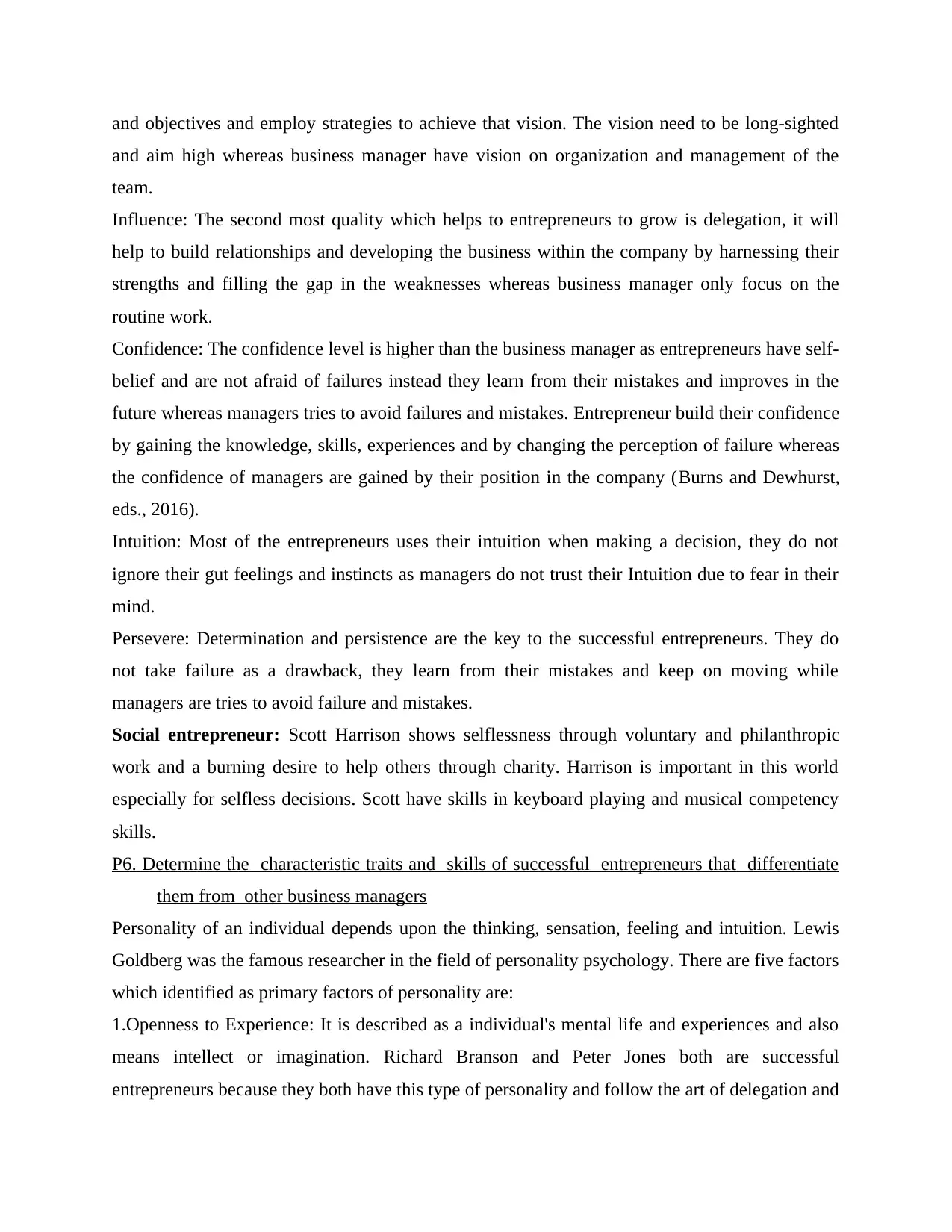
and objectives and employ strategies to achieve that vision. The vision need to be long-sighted
and aim high whereas business manager have vision on organization and management of the
team.
Influence: The second most quality which helps to entrepreneurs to grow is delegation, it will
help to build relationships and developing the business within the company by harnessing their
strengths and filling the gap in the weaknesses whereas business manager only focus on the
routine work.
Confidence: The confidence level is higher than the business manager as entrepreneurs have self-
belief and are not afraid of failures instead they learn from their mistakes and improves in the
future whereas managers tries to avoid failures and mistakes. Entrepreneur build their confidence
by gaining the knowledge, skills, experiences and by changing the perception of failure whereas
the confidence of managers are gained by their position in the company (Burns and Dewhurst,
eds., 2016).
Intuition: Most of the entrepreneurs uses their intuition when making a decision, they do not
ignore their gut feelings and instincts as managers do not trust their Intuition due to fear in their
mind.
Persevere: Determination and persistence are the key to the successful entrepreneurs. They do
not take failure as a drawback, they learn from their mistakes and keep on moving while
managers are tries to avoid failure and mistakes.
Social entrepreneur: Scott Harrison shows selflessness through voluntary and philanthropic
work and a burning desire to help others through charity. Harrison is important in this world
especially for selfless decisions. Scott have skills in keyboard playing and musical competency
skills.
P6. Determine the characteristic traits and skills of successful entrepreneurs that differentiate
them from other business managers
Personality of an individual depends upon the thinking, sensation, feeling and intuition. Lewis
Goldberg was the famous researcher in the field of personality psychology. There are five factors
which identified as primary factors of personality are:
1.Openness to Experience: It is described as a individual's mental life and experiences and also
means intellect or imagination. Richard Branson and Peter Jones both are successful
entrepreneurs because they both have this type of personality and follow the art of delegation and
and aim high whereas business manager have vision on organization and management of the
team.
Influence: The second most quality which helps to entrepreneurs to grow is delegation, it will
help to build relationships and developing the business within the company by harnessing their
strengths and filling the gap in the weaknesses whereas business manager only focus on the
routine work.
Confidence: The confidence level is higher than the business manager as entrepreneurs have self-
belief and are not afraid of failures instead they learn from their mistakes and improves in the
future whereas managers tries to avoid failures and mistakes. Entrepreneur build their confidence
by gaining the knowledge, skills, experiences and by changing the perception of failure whereas
the confidence of managers are gained by their position in the company (Burns and Dewhurst,
eds., 2016).
Intuition: Most of the entrepreneurs uses their intuition when making a decision, they do not
ignore their gut feelings and instincts as managers do not trust their Intuition due to fear in their
mind.
Persevere: Determination and persistence are the key to the successful entrepreneurs. They do
not take failure as a drawback, they learn from their mistakes and keep on moving while
managers are tries to avoid failure and mistakes.
Social entrepreneur: Scott Harrison shows selflessness through voluntary and philanthropic
work and a burning desire to help others through charity. Harrison is important in this world
especially for selfless decisions. Scott have skills in keyboard playing and musical competency
skills.
P6. Determine the characteristic traits and skills of successful entrepreneurs that differentiate
them from other business managers
Personality of an individual depends upon the thinking, sensation, feeling and intuition. Lewis
Goldberg was the famous researcher in the field of personality psychology. There are five factors
which identified as primary factors of personality are:
1.Openness to Experience: It is described as a individual's mental life and experiences and also
means intellect or imagination. Richard Branson and Peter Jones both are successful
entrepreneurs because they both have this type of personality and follow the art of delegation and
⊘ This is a preview!⊘
Do you want full access?
Subscribe today to unlock all pages.

Trusted by 1+ million students worldwide
1 out of 16
Related Documents
Your All-in-One AI-Powered Toolkit for Academic Success.
+13062052269
info@desklib.com
Available 24*7 on WhatsApp / Email
![[object Object]](/_next/static/media/star-bottom.7253800d.svg)
Unlock your academic potential
Copyright © 2020–2026 A2Z Services. All Rights Reserved. Developed and managed by ZUCOL.




